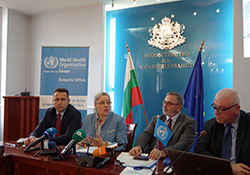New profile of health and well-being in Bulgaria shows significant progress

WHO
WHO/Europe launched the fifth in a series of publications providing in-depth analyses of health situations in Member States. The report focuses on Bulgaria, and reveals a health situation that has improved significantly in the last decade but still faces considerable challenges.
“Bulgaria: profile of health and well-being” was written in collaboration with the Ministry of Health. It uses Health 2020 indicators to provide insights into the country’s performance against Health 2020 targets and implementation.
The profile is accompanied by the succinct “Bulgaria: highlights on health and well-being”, a summary designed for policy-makers. The summary pinpoints key policy issues and trends and provides an analysis of available information and evidence on the health situation of the country.
Improving trends
Life expectancy in Bulgaria has now reached 75 years, which is 2.5 years below the average for the WHO European Region. Bulgaria has made progress in most of the 19 core Health 2020 indicators. In addition to improving life expectancy at birth, it has succeeded in reducing premature mortality (for people aged 30–69 years) from the 4 main noncommunicable diseases and external causes of death, and maintaining high levels of child immunization against preventable illness such as measles, rubella and poliomyelitis.
The country has also made progress in several indicators linked to the social determinants of health, including the reduction of unemployment rates for both men and women and the development of a set of policies addressing inequalities. In spite of this, however, the international inequality indicator (Gini coefficient) had increased in Bulgaria by 2014.
Facing considerable challenges
In spite of the obvious improvement in the country’s overall health status, challenges remain in many areas related to both communicable and noncommunicable diseases. While all-ages and premature mortality are both decreasing, fluctuating mortality rates from cancers and diseases of the digestive system are generally on the rise.
While Bulgaria has achieved considerable reductions in infant mortality, its rate remains higher than that for the Region as a whole. Recent trends also show a pattern of general increase for the incidence of HIV infection in Bulgaria, though it is still much lower than the regional average.
For Bulgaria to attain a health status similar to the best in the Region, it will need to adopt a multisectoral approach that strengthens collaboration among key stakeholders in both civil society and government.
In particular, Bulgaria should address high levels of tobacco smoking and alcohol consumption; the increased prevalence of obesity; the growing burden of noncommunicable diseases; and the high share of private household out-of-pocket payments for health.
The country has demonstrated a genuine commitment to improving population health, and has aligned its recently adopted national health policy (2014–2020) with Health 2020.
Dr Claudia Stein, Director of the Division of Information, Evidence Research and Innovation, commended the publication: “This report shows improvements in the health of the Bulgarian population, and the commitment the country has demonstrated to improving it. Of course some challenges remain, but understanding what they are is a key step towards improving the country’s health profile in the years ahead.”
More country profiles to come
Previous reports were published on Greece, Slovenia, the Republic of Moldova and Georgia. Over the coming years and covering as many countries as possible, WHO/Europe will produce more of these detailed country profiles.
The profiles describe the national health situation using the latest data available. These data are analysed in conjunction with those of other countries in order to create meaningful comparisons.
The reports are available via the European Health Information Gateway and its accompanying European health statistics mobile application, where data sets can be explored in more detail and in comparison to other countries.



